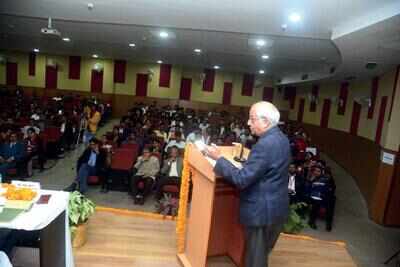
Varanasi: Our scriptures should not be viewed as watertight compartments, but should be studied with an open mind for good understanding, said retired judge of Supreme Court, Justice B N Srikrishna in his inaugural address at a workshop on vedic jurisprudence at Banaras Hindu University on Saturday.
Addressing the inaugural function of the two-day workshop on vedic jurisprudence and its impact on contemporary world, organized by Centre for Vedic Science, BHU, Justice Srikrishna said, “Our shastras cannot be viewed as watertight compartments. Each should be studied independently, with an open mind, since this is real ‘vidya’ which is necessary for ‘moksh’. All old need not be good and all modern need not be bad, intellectuals should interpret things as per needs.”
Speaking on the occasion, Prof. Harekrishna Satapathy, vice chancellor of Kalinga Institute of Social Sciences (Deemed University), Odisha, highlighted the importance of dharma in justice delivery system and said that ‘satya’ and ‘vidya’ are also aspects of dharma.
“There are misconceptions that women were treated poorly in old times in India. The women were given utmost respect and honour in vedic period,” Prof Satapathy said while citing several examples from vedas.
He said resolution, perception and expression are prerequisites for right action which brings satisfaction.
BHU rector Prof. V K Shukla shared the glorious history of the university and vision of its founder Pt Madan Mohan Malviya. Earlier, the centre coordinator Upendra Kumar Tripathi welcomed the guests.
Centre for Vedic Sciences, the first of its kind in country, will explore the vedic corpus related to sciences and conduct multidisciplinary research. It was inaugurated by Prime Minister Narendra Modi during his visit on February 16. The centre has been established with the financial support from UP government.
Tripathi said the centre will run both long-term and short-term research projects and collect information on vedic scientific knowledge to include in existing science courses being taught in educational institutions.
It will prepare reference documents and books for promotion of logical and scientific achievements of Vedic seers and scholars and formalize scientific study and Vedic intellectual heritage.
The centre has a state-of-art laboratory for research on the effect of Vedic mantras, rituals, yoga and meditation on human mind through neuro-psychological studies.
Addressing the inaugural function of the two-day workshop on vedic jurisprudence and its impact on contemporary world, organized by Centre for Vedic Science, BHU, Justice Srikrishna said, “Our shastras cannot be viewed as watertight compartments. Each should be studied independently, with an open mind, since this is real ‘vidya’ which is necessary for ‘moksh’. All old need not be good and all modern need not be bad, intellectuals should interpret things as per needs.”
Speaking on the occasion, Prof. Harekrishna Satapathy, vice chancellor of Kalinga Institute of Social Sciences (Deemed University), Odisha, highlighted the importance of dharma in justice delivery system and said that ‘satya’ and ‘vidya’ are also aspects of dharma.
“There are misconceptions that women were treated poorly in old times in India. The women were given utmost respect and honour in vedic period,” Prof Satapathy said while citing several examples from vedas.
He said resolution, perception and expression are prerequisites for right action which brings satisfaction.
BHU rector Prof. V K Shukla shared the glorious history of the university and vision of its founder Pt Madan Mohan Malviya. Earlier, the centre coordinator Upendra Kumar Tripathi welcomed the guests.
Centre for Vedic Sciences, the first of its kind in country, will explore the vedic corpus related to sciences and conduct multidisciplinary research. It was inaugurated by Prime Minister Narendra Modi during his visit on February 16. The centre has been established with the financial support from UP government.
Tripathi said the centre will run both long-term and short-term research projects and collect information on vedic scientific knowledge to include in existing science courses being taught in educational institutions.
It will prepare reference documents and books for promotion of logical and scientific achievements of Vedic seers and scholars and formalize scientific study and Vedic intellectual heritage.
The centre has a state-of-art laboratory for research on the effect of Vedic mantras, rituals, yoga and meditation on human mind through neuro-psychological studies.
Trending Topics
LATEST VIDEOS
City
 Thane: Two youths suspected of mobile theft beaten up, stripped naked and made to walk
Thane: Two youths suspected of mobile theft beaten up, stripped naked and made to walk  UP: Bhubaneswar bound express train decouple twice, sending passengers into tizzy
UP: Bhubaneswar bound express train decouple twice, sending passengers into tizzy  Sexual misconduct: Another nun accuses Kerala's Bishop Franco Mulakkal
Sexual misconduct: Another nun accuses Kerala's Bishop Franco Mulakkal  UP govt plans to auction over 3000 tonnes of gold reserved in Sonbhadra mine
UP govt plans to auction over 3000 tonnes of gold reserved in Sonbhadra mine
More from TOI
Navbharat Times
Featured Today in Travel
Get the app



